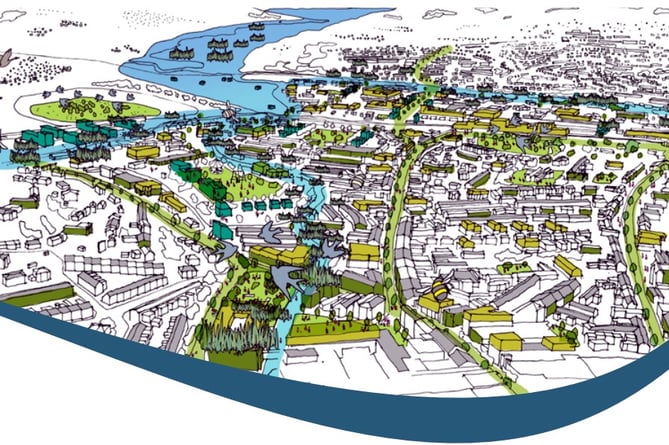TEIGNBRIDGE’S draft local plan, the blueprint for development across the district until 2040, will go out to a final public consultation after it was approved by councillors.
Described by the council as ‘ambitious and forward looking,’ the draft plan aims to generate growth, provide homes and jobs for local people, protect environments, create more open spaces and tackle climate change.
It features land allocations for 4,560 homes, with about a quarter of new properties to be affordable, more homes built for people with mobility issues and ensures all developments in the district are net zero by 2028.
The approximate distribution of new homes across the district will be:
• Newton Abbot and Kingsteignton Garden Community – 37%
• Edge of Exeter – 46%
• Coastal and rural towns – 5%
• Villages – 12%
In addition, about 65 hectares of land is allocated in the draft plan for employment sites while two sites are identified for gypsies and travellers.
The vast majority of councillors approved the draft at this week’s full council meeting.
It will now go out for a minimum six-week public consultation before its submission for examination by the planning inspectorate.
Councillors were meant to consider the plan last month but an announcement by housing secretary Michael Gove on a proposed relaxation to housebuilding targets led to a delay to allow time to consider any implications.
It led to a further recommendation being agreed by members, which allows the council to review the total number of new homes in the local plan if the government finalises making local housing targets advisory rather than mandatory.
There are three major expansions to existing settlements proposed. Firstly, at Bradmore, located west of Houghton Barton on the outskirts of Newton Abbot, for approximately 1,050 homes. These are in addition to the 1,800 homes for the area already allocated in the existing local plan.
On the edge of Exeter, approximately 900 homes are planned for Markham Village, which will be created as a small new village between Ide and Shillingford Abbot, while a mixed use development of approximately 750 homes at Peamore is also proposed.
The plan will increase the rate of new housebuilding in Teignbridge to an average of 741 homes per year and all new-build open market homes on allocated sites will be occupied as a primary residence – secured through a legal process.
It adds how brownfield sites will be prioritised to help regenerate town centres, while most new homes would be located close to jobs, services and sustainable transport. Some small development sites are also identified in larger villages to help sustain essential local services.
Introducing the draft plan at this week’s meeting, executive member for planning, Councillor Gary Taylor (Lib Dem, Dawlish SW) said: ‘I firmly believe this is an ambitious, forward-looking new local plan that will help deliver better and more environmentally sustainable development in our district over the next two decades.’
He added the latest version of the plan had been shaped by the feedback from the previous four consultations, which attracted over 7,000 responses.
However, while it was approved for consultation, some members raised issues around certain elements.
Cllr Mike Hocking (Independent, Bradley) asked what extra powers the plan gives the council to ensure there are sufficient transport links in place before developments are built, claiming these have ‘failed’ for the new builds around Newton Abbot.
He was told by an officer that some developments had been allowed on appeal, against the council’s initial decision, and that the proposed sites would include ‘not only the infrastructure on site for allowing better walking and cycling opportunities, but then strategic links [as well].’
Concern about water management in the plan was also raised, with Cllr Andrew MacGregor (Anti-Violence & Positive Politics Group, Bishopsteignton) highlighting the current numbers of waste disposals into the district’s estuaries and waterways.
‘From my perspective, we need to see more in the plan about what we’re doing about South West Water’s inability and failures to provide a service as it currently stands, before we start building new infrastructure,’ he said.
In response, an officer said the council has been liaising with South West Water as part of the plan, adding that the company requires all new developments to pay an infrastructure charge and to put in place ‘sustainable drainage systems.’
On the specific sites allocated for housing, Cllr MacGregor claimed two sites in Bishopsteignton presented a ‘highway safety issue for pedestrians and cyclists getting into the town,’ but he was told that Devon County Council’s highways department had not raised any concerns.
Meanwhile, Cllr Andy Swain (Lib Dem, Kenn Valley) said his local community was ‘not keen’ on the planned site at Markham Village, and fellow Liberal Democrat David Cox said his ward of Teignmouth ‘cannot take any more development.’
Potential issues around flooding led Cllr Adrian Patch (South Devon Alliance, Haytor) to say he was “not totally convinced” that one of the significant planned developments in Liverton would be a ‘robust site for housing.’
‘I know that going back about three or four years ago, there was huge flooding in that area including the main road which will go past or very close to that development,’ he said.
The draft plan was approved with four councillors voting against, meaning it will now go out for a minimum six-week public consultation starting on 23 January. All comments will then be sent to the planning inspectorate.
If approved, the plan will come into force in early 2024.




